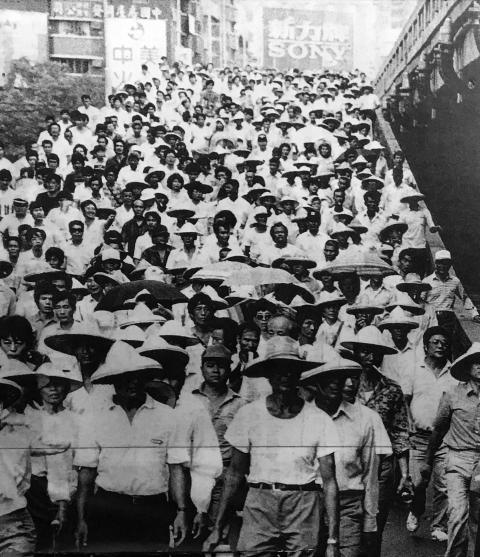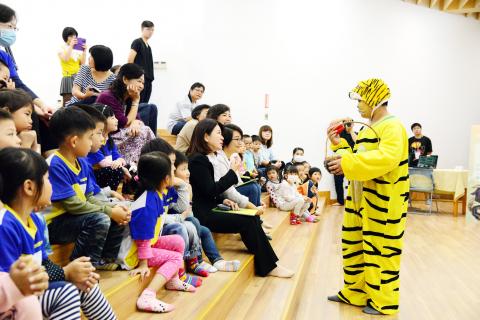May 22 to May 28
Chien Chi (簡吉), the “professional peasant revolutionary” featured in last week’s column, was not meant to live a complacent life. In 1947, he was in trouble again for organizing a resistance army to fight Chinese Nationalist Party (KMT) troops during the suppression of the 228 Incident. He went into hiding and worked as a Chinese Communist Party agent until he was caught and executed in 1951.
There would only be a handful of minor and regional farmer protests over the following several decades under the KMT’s reign of White Terror, where dissidents like Chien faced dire consequences. Early land reforms largely eliminated the landowner system, which boosted production but also allowed the state to directly control the farmers. Wu Yen-chang writes in The Formation and Development of Taiwan’s Farmers’ Movement (台灣農民運動的形成與發展) that farmers were organized under state-funded farmers associations, which “operated according to the benefit of the country instead of the agriculture industry and individual farmers.”

Photo: Huang Shu-li, Taipei Times
DISCONTENT BOILS OVER
Martial law would not be lifted until 1987, but as state control loosened, various social movements took shape in the early 1980s, championing issues ranging from pollution to women’s rights to student government elections. Wu writes that these activities encouraged the farmers to speak out as well. He adds that non-KMT politicians, such as Chu Kao-cheng (朱高正), often sought to broaden their voting base by taking up farmers’ issues.
Taiwan’s farmers were hit hard by natural disasters in 1986, which Wu writes was the worst in more than two decades. To make matters worse, farmers began noticing that their fruit prices were plummeting. In an interview with Reading Taiwan magazine, (重現台灣史) opposition politician Lin Feng-hsi (林豐喜) says that nobody could figure out why until they saw that fruit stands were selling mostly imported fruit.

Photo: Lin Kuo-hsien, Taipei Times
Under Lin’s lead, more than 3,000 farmers gathered in front of the Legislative Yuan on Dec. 8, 1987 to protest the increase in imports. The government put together a task force and met with the farmers, where they presented their requests. Five months later, about 500 people rode their farming vehicles on the streets of Taipei during trade talks between the US and Taiwan, protesting the proposed importing of turkey meat. Lin put together a call for farmers insurance as well.
DRAWING BLOOD
Lin says that he was against taking to the streets so on May 20, 1988, but other activists went ahead with the plan. Spearheaded by the Yunlin Farmers Association (雲林農權會) and future legislators Lin Kuo-hua (林國華) and Hsiao Yu-chen (蕭裕珍), thousands of farmers from across the country met in front of Taipei’s Sun Yat-sen Memorial Hall in the morning. Their demands included universal insurance for farmers, reduced taxes on fertilizer, free trade of farmland and reform to farmers associations.
According to a Reading Taiwan article on the event, trouble started when the marchers reached the Legislative Yuan. Some protesters attempted to enter the building to use the restroom but were turned away by the police. Tensions rose and people started throwing cans and rocks at the authorities, who responded by arresting three protesters. Lin Kuo-hua charged the building in a rescue attempt, and was knocked unconscious and sent to the hospital. The situation worsened, and the Legislative Yuan’s sign was torn down before the angry protesters turned their attention to other government agencies. Clashes continued throughout the day as riot police arrived with barricades and water trucks, while protesters smashed the National Police Agency sign and burned cars. Gas bombs were also thrown.
Lin Kuo-hua and Hsiao were arrested around 7pm. By this time, many farmers had left, but the ranks were bolstered by angry civilians and peaceful students. The chaos continued into the night as riot police lost patience and charged the protesters, who responded with more violence and destruction. Things did not calm down until the morning. It was the most severe incident between civilians and authorities since the 228 Incident.
More than 100 people were hospitalized and 92 faced criminal charges. There was much debate on whether the violence was premeditated, as the police claimed to have found a whole truckload of rocks hidden under vegetables. Only 13 people were acquitted while Lin, Hsiao and other organizers received the heaviest sentences of nearly three years.
AFTERMATH
An investigation into the incident by Academia Sinica scholar Hsu Mu-chu (許木柱) concluded that the protesters did attack first, but also denounced the riot police for exacerbating the situation. Hsu also declared that the violence was not premeditated but a result of emotions running high on both sides.
The two Lins have conflicting opinions on the effects of this incident, both recorded in Reading Taiwan.
“If the 520 Incident hadn’t happened, there were many other farmer issues I had planned to tackle. But I noticed that most farmers became reluctant to protest. The momentum we gained after our Dec. 8 efforts was completely erased. The large-scale peasant movement that rose again after 60 years of silence was abruptly aborted,” says Lin Feng-hsi.
“I believe that the 520 incident helped the farmers greatly,” Lin Kuo-hua says. “The government started taking farmer’s rights seriously and sped up its policy reform. Our demands were eventually met, and I believe that farmers will agree with me that 520 yielded positive results.”
Taiwan in Time, a column about Taiwan’s history that is published every Sunday, spotlights important or interesting events around the nation that have anniversaries this week.

Taiwan has next to no political engagement in Myanmar, either with the ruling military junta nor the dozens of armed groups who’ve in the last five years taken over around two-thirds of the nation’s territory in a sprawling, patchwork civil war. But early last month, the leader of one relatively minor Burmese revolutionary faction, General Nerdah Bomya, who is also an alleged war criminal, made a low key visit to Taipei, where he met with a member of President William Lai’s (賴清德) staff, a retired Taiwanese military official and several academics. “I feel like Taiwan is a good example of

March 2 to March 8 Gunfire rang out along the shore of the frontline island of Lieyu (烈嶼) on a foggy afternoon on March 7, 1987. By the time it was over, about 20 unarmed Vietnamese refugees — men, women, elderly and children — were dead. They were hastily buried, followed by decades of silence. Months later, opposition politicians and journalists tried to uncover what had happened, but conflicting accounts only deepened the confusion. One version suggested that government troops had mistakenly killed their own operatives attempting to return home from Vietnam. The military maintained that the

Before the last section of the round-the-island railway was electrified, one old blue train still chugged back and forth between Pingtung County’s Fangliao (枋寮) and Taitung (台東) stations once a day. It was so slow, was so hot (it had no air conditioning) and covered such a short distance, that the low fare still failed to attract many riders. This relic of the past was finally retired when the South Link Line was fully electrified on Dec. 23, 2020. A wave of nostalgia surrounded the termination of the Ordinary Train service, as these train carriages had been in use for decades

Lori Sepich smoked for years and sometimes skipped taking her blood pressure medicine. But she never thought she’d have a heart attack. The possibility “just wasn’t registering with me,” said the 64-year-old from Memphis, Tennessee, who suffered two of them 13 years apart. She’s far from alone. More than 60 million women in the US live with cardiovascular disease, which includes heart disease as well as stroke, heart failure and atrial fibrillation. And despite the myth that heart attacks mostly strike men, women are vulnerable too. Overall in the US, 1 in 5 women dies of cardiovascular disease each year, 37,000 of them